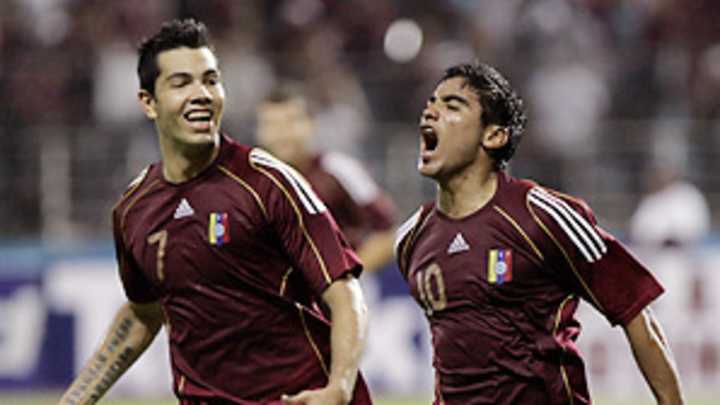Venezuela has an eye on the future


It was just more than five months ago that Diego Maradona's reign in charge of Argentina seemed on the right track. After a couple of wins in friendly matches, he debuted in World Cup qualification with a conclusive 4-0 triumph at home to Venezuela.
Since then, of course, things have gone badly wrong. But his opponents back on March 28 have been traveling in the other direction.
The headlines have gone to Argentina's problems, to Brazil's cruise to qualification and, though not as much as it deserves, to Paraguay's achievement in making it to its fourth successive World Cup. But quietly, perhaps off the radar screen to many, one of the big South American soccer stories of 2009 is the rise of Venezuela.
They were just the other team in Buenos Aires on March 28, like the set of chumps set up to lose to the Harlem Globetrotters. The 4-0 defeat left Venezuela eighth in the table of 10, with 10 points against the 19 of second-place Argentina. But look at them now. They stand on 21 points, just one less than Maradona and his men. If the Argentines are struggling to qualify for 2010, La Vinotinto is one of the teams breathing down their necks.
This is already the most successful campaign in Venezuela's history. The one South American nation that for so long seemed impervious to soccer, the land where baseball and beauty contests ruled, Venezuela first gave signs of becoming a contender in the qualifiers for the '02 World Cup, when it accumulated 16 points. In the next campaign, it picked up 18. With three rounds to go, it already has three more -- and it was after their meeting with Maradona that the Venezuelans' fortunes really picked up.
The 4-0 loss in Argentina was their fifth game without a win, their fourth consecutive defeat and the third without scoring a goal. Since then, though, they have gone unbeaten through the subsequent five rounds, with three wins and two draws. And the startling thing about this mini-run of success is that it has been carried out while fighting a war on two fronts.
At the start of this year, Venezuela hosted the South American Under-20 Championships. With the benefit of home advantage, for the first time in its history, the team picked up one of the continent's four slots in the Under-20 World Cup, which kicks off in Egypt at the end of next week. This is a historic moment for Venezuelan soccer, and hopes are high that a new generation of players can come through and take the country's game up to a whole new level.
Some of these youngsters have been fast-tracked into the senior squad to give them extra experience. In this year's World Cup qualifiers, seven members of the Under-20 squad got their first senior-team caps, with others given an opportunity in friendlies.
But the clash of dates has slowed down this process. With the Under-20s preparing for Egypt, older players were used for the two recent World Cup qualifiers -- as well as for next month's final two. Venezuela, then, has managed to initiate a generational change while also relying on its more established players -- and in what could be a very confusing situation for all involved, has kept picking up good results. It's a truly excellent achievement, especially in man management, from its extraordinarily youthful coach, César Farías.
Just 36, Farías is the third in a line of coaches who have played a significant part in Venezuela's rise. First came the well-respected Argentine, JoséOmar Pastoriza. A decade ago, he identified a group of players that have formed the core of the national team ever since. Results showed a significant improvement when Richard Páez took over. A Venezuelan, he understood better than Pastoriza the mentality of his players. They had been sent out to lose by as little as possible; when they were sent out to win, it was a different story.
Páez perhaps became a victim of his own success -- it created expectations to which the team wasn't yet ready to live up. And so, he was replaced by Farías at the end of '07. The following year wasn't easy -- though there was a first-ever victory over Brazil in a friendly played in the U.S. But it's this year in which Farías really has shown his quality, because as well as presiding over the upturn in fortunes in World Cup qualification, he has also been in charge of the Under-20 side.
For all his youth, Farías has a decade-and-a-half of top coaching experience under his belt. Appearing even younger than his age, he must surely have passed through some difficult times establishing his authority over players much older than he was. His résumé, though, makes impressive reading. There may be a lack of big titles.
But he seems to have consistently left clubs in a better state than when he found them -- Nueva Cádiz, Zulianos, Trujillanos, Deportivo Táchira (whom he took to the quarterfinals of the '04 Copa Libertadores), Mineros and Anzoátegui all have benefited from his services -- and now he's confirming his quality with two levels of the Venezuelan national team.
The Under-20s face a difficult task in Egypt against Nigeria, Tahiti and Spain. But the senior side has it even harder if it's are to round off an impressive year by qualifying for the World Cup for the first time. A poor goal difference means there's probably only one way Venezuela can charge in and grab fifth place in the standings and a two-game playoff against a team from CONCACAF. That would be by inflicting Brazil's first-ever home defeat in World Cup qualifying in the final round on Oct. 14.
If Farías and his men can pull that one off, now that really would be a story.
